Prince Reza Pahlavi Urges Support For Political Prisoners in Iran

Iran’s exiled Prince Reza Pahlavi has made a public appeal to his compatriots encouraging global support for political prisoners in Iran.

Iran’s exiled Prince Reza Pahlavi has made a public appeal to his compatriots encouraging global support for political prisoners in Iran.
Speaking in front of the US State Department, alongside Darin Dalili and Ghazaleh Sharmahd, children of and , dual-national prisoners in Iran, Prince Pahlavi said that Iranians, regardless of their global location, remain unwavering in solidarity for their fellow citizens, both within and outside the country.
"We will not remain silent and indifferent to decisions or policies that continue such practices,” he said.
Extending further support to all political prisoners Prince Pahlavi appealed to people worldwide to urge governments not to yield to extortion in exchange for the release of captives. He also criticized the practice of unfair hostage negotiation, stating that the value of all human life is equal. This comment comes after Dalili and Sharmahd were left out of a hostage release deal between Iran and the United States, where over $6 billion blocked funds were released in exchange for American detainees.
Dalili, a former captain of Iran Shipping Company and a US resident, was arrested during a trip to Tehran in 2016 for his father's funeral, after which he was apprehended by security forces.
Jamshid Sharmahd, 67, a former resident of the United States, was abducted by Iranian authorities during a trip from Germany to India in August 2020 during a three-day layover in Dubai.
In addition to suppressing dissidents and detaining political activists and journalists abroad, the Islamic Republic has regularly detained foreign or dual-national citizens as hostages to leverage demands against Western nations.
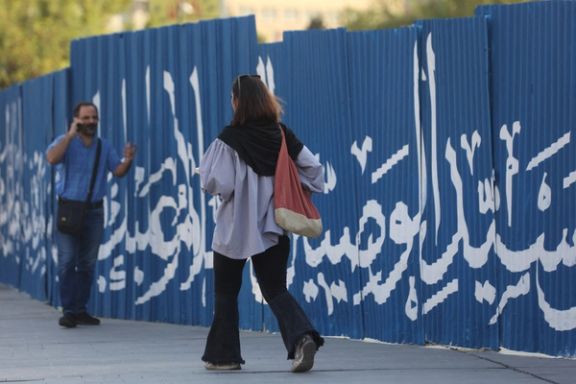
Controversy still surrounds Iran’s new hijab law, with a reformist daily calling it a decision made by 10 parliamentarians for a population of 85 million.
In an article published on Monday, Ham-Mihan newspaper stated, “Only 10 members of the parliament, with a certain political inclination, passed a bill in a week that is expected to impact the lives of 85 million Iranians, including dissidents.”
The paper added that the law will lead to accusations against a significant portion of society over issues related to women's dress code and hijab. Details about the enactment of the new bill are still unknown, as parliament moved earlier in August to make the new hijab regulations even more opaque by approving the regulations without an open session, fearing further backlash.
Iranian lawmakers voted that the bill can be considered under Article 85 of the constitution, which allows the parliament to delegate the bill's approval to an internal committee, effectively sidelining any opposition.
According to Ham-Mihan, the internal committee consists of the same lawmakers who added about 55 articles to the original "Hijab and Chastity" bill, which initially comprised only 15 articles when submitted by the administration of Ebrahim Raisi.
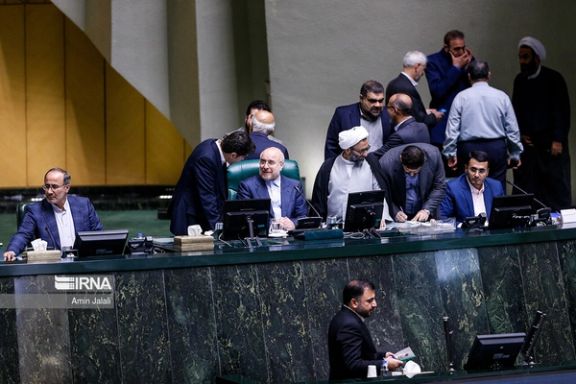
The paper quoted Parliament Speaker Mohammad-Bagher Ghalibaf as saying that discussing a bill with 70 articles in an open session would take a lot of time, especially because about 1,500 points have been suggested by lawmakers to be considered during the discussions. “Some say the parliament is reviewing the bill under Article 85 of the Constitution so that no one understands what is being approved, but this is not true,” Ghalibaf said.
The uprising sparked by the death in police custody of Mahsa Amini in September 2022 has made it increasingly difficult for the clerical regime to enforce the mandatory Islamic dress code. Since the beginning of the ‘Women, Life, Freedom’ movement, tens of thousands of girls and women have shed their compulsory hijab. The regime seeks to criminalize hijab defiance, but no branch of government wants to be solely responsible for the complications of such a provocative and risky action in society.
The fate of the hijab bill, which legal experts claim is against the Iranian Constitution and not practical to implement due to the government's limited means, is still in limbo as conflicting reports circulate about the process. But what is clear is that the government has to devote extensive police and other resources to monitor millions of women, stop those who appear without hijab, issue fines or summon them to court.
This means thousands of confrontations in the streets every day between ordinary women and teenage girls with police and special hijab enforcement agents. It was one such confrontation and arrest that led to Mahsa Amini's death and the most serious antigovernment unrest in 44 years.
Some wonder why the regime has chosen to go the extra mile to force hijab on women, risking another round of protests. Hardliners have answered the question, insisting that the clerical regime cannot retreat from the hijab issue, otherwise it will lose its authority to control the society.
Lawmakers are still voicing opinions and disagreements about how the bill should receive its final seal of approval. Apparently, once the committee approves a bill under the particular constitutional provision, the full chamber has no right to alter it. The Guardian Council, which has the right to review all legislation, will probably review the hijab law too.
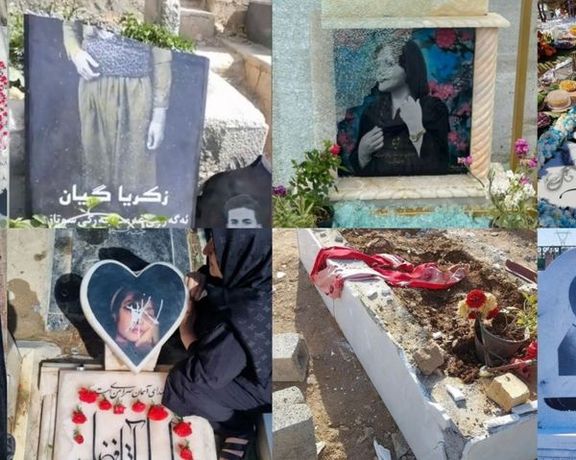
Amnesty International has revealed that the graves of protesters killed during last year’s protests have been vandalized and their families harassed.
The human rights organization's latest research, published Monday, provides concrete evidence of the Iranian authorities' efforts to silence those seeking justice for their loved ones.
The report reveals that graves belonging to more than 20 victims from 17 cities have been vandalized. Graves have been damaged with tar or paint and in some cases set on fire, headstones have been shattered, and inscriptions describing victims as “martyrs” or stating that they died for the cause of freedom have been scraped away. The authorities have also tried to stop victims’ families from holding ceremonies at the graves of their loved ones.
There have not been any official investigations into these acts and in the report, Amnesty International demands immediate action.
"Amnesty International calls on all states to exercise universal jurisdiction and issue arrest warrants for Iranian officials, including those with command responsibility, who are reasonably suspected of criminal responsibility for crimes under international law committed during and in the aftermath of the uprising," urged Diana Eltahawy, Amnesty International’s Deputy Regional Director for the Middle East and North Africa.
Mahsa Amini's family has also faced repeated damage to her grave. The Iranian authorities have announced plans to alter Aichi cemetery in Saqqez, Kurdistan province, where she is buried, limiting public access.
The human rights organization emphasized the international community's responsibility towards protecting the rights of victims' families. These families are subject to arbitrary arrests, unjust prosecutions, coercive interrogations, and unlawful surveillance. The organization demands that the Iranian authorities respect their right to freedom of expression, assembly, and association.
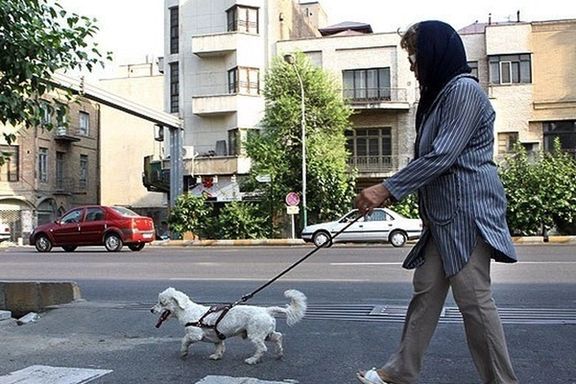
A real estate agency is sealed off and its owner arrested in Iran after a video went viral of the property agency transferring the ownership of an apartment to a dog.
The footage showed an Iranian couple signing a contract transferring the title of their apartment to their small furry white dog Chester.
In the video, which seems like a practical joke, the agent is shown describing the property while Chester's owner places his pawprint on the deed.
Iran’s police issued a statement on Sunday announcing the arrest and the shutdown of the agency, with Tehran’s deputy prosecutor Reza Tabar mentioning “issuing an invalid contract for an apartment unit” as the reason behind the arrest. He added that “this action is illegal and was meant to demean the norms of society.”
The Islamic Republic regime views keeping dogs as a symbol of Westernization that can be dangerous and should be prohibited. Dogs are generally considered 'impure' in Islam and banned in public places by some majority-Muslim countries including Saudi Arabia. Iranian parliamentarians in November proposed a bill banning selling and keeping of pets.
Lawmakers backing the measure claimed the ban was meant to protect public health. While working dogs have always been common in Iran’s rural areas and on farms, keeping pets has only recently become fashionable in urban areas despite occasional police crackdowns.
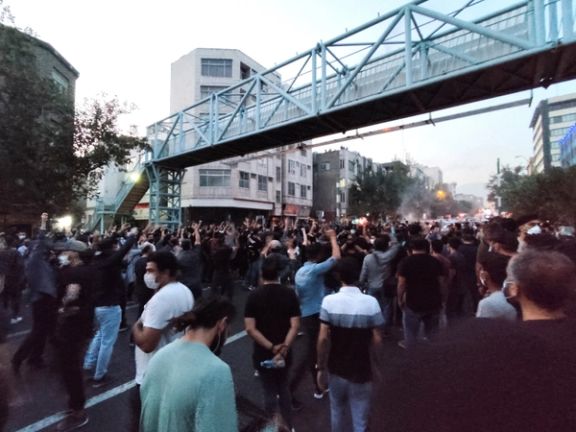
Human Rights Watch has reported mass arrests of Iranian women’s rights defenders by the regime ahead of the anniversary of Women, Life, Liberty protests.
The New York-based rights watchdog said Saturday that regime authorities have arrested at least a dozen activists and intensified pressure on a wide range of peaceful dissidents ahead of the anniversary of the nationwide rallies that swept the country beginning in Spetember 2022, following the death of Mahsa Amini in police custody.
The uprising -- dubbed the Women, Life, Liberty movement -- has been the boldest challenge against the clerical autocracy since its establishment in 1979. The regime brutally cracked down on the antigovernment protests, killing more than 500 people and arresting over 22,000 others.
“Iranian authorities are using their go-to playbook of putting maximum pressure on peaceful dissidents ahead of the anniversary,” said Tara Sepehri-Far, senior Iran researcher at Human Rights Watch. “The arbitrary arrests of a dozen activists are aimed at suppressing popular discontent with ongoing impunity and rights violations.”
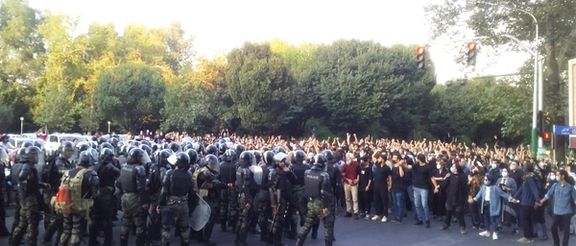
In recent weeks, the Islamic Republic regime has intensified its intimidation campaign to discourage potential unrest, detaining civil and human rights activists and students as well as harassing families of protesters who died during the crackdown, with reports coming from several provinces, including Tehran, Gilan, Kordestan, West Azarbaijan, and Esfahan (Isfahan).
At least 12 people were arrested in Gilan province this week, including five women's rights advocates, a photographer, a poet, a graphic designer, and three pharmacists. The General Intelligence Office of the province issued a statement saying it had arrested a network of 12 people “who were planning to disrupt security” and were participating in trainings aimed at a “soft overthrow” of the regime, without providing any evidence. Hengaw Human Rights Organization, a Kurdish rights group, said Thursday that at least 15 people have been arrested in Kurdish majority cities in the past few days.
The intelligence ministry and the Revolutionary Guard (IRGC) intelligence organization (SAS) have been reaching out to individuals who were arrested during the anti-regime protests. They are warning them not to participate in any demonstrations on the anniversary of the protest movement, according to sources in Iran who spoke to Iran International.
On Thursday, August 17, Supreme Leader Ali Khamenei held a meeting with a large group of Revolutionary Guard commanders and praised them for their performance - which has resulted in the deaths of 500 civilians with thousands more injured and tens of thousands arrested. So far, seven protesters have been executed, and several others face execution. Earlier in the week, hardliner cleric and member of the Iranian Assembly of Experts Ahmad Khatami issued a stern threat against any future protesters, saying that they would be met with forceful suppression, as if the current rounds of suppression are not forceful.
Sepehri-Far noted, “The street protests may have slowed down but the authorities are continuing their crackdown, targeting veteran civil society and human rights defenders,” adding, “UN member states that are in dialogue with Iran should put the rights defenders’ plight at the center of their engagement.”
In addition to arrests and other intimidation tactics, the regime is about to finalize a new hijab bill, whose details have already led to debates even among the regime officials. The enactment of stricter hijab measures is expected to re-ignite further protests. The uprising that was sparked by the death in police custody of Mahsa Amini in September has made it increasingly difficult for the clerical regime to enforce the mandatory Islamic dress code.
To avoid the public backlash over the violent enforcement of hijab laws, the Islamic Republic has recently begun implementing a wide range of measures from public humiliation tactics to using traffic cameras to identify women without hijab.
According to a document obtained by Iran International, the regime has also banned gas stations managers from supplying fuel for women who ride motorcycles, which is forbidden in the Islamic Republic.
Political analyst Ali-Hossein Ghazizadeh said Friday on X that the Intelligence Ministry’s campaign of arrests and intimidation has been “unprecedented” even for the Islamic Republic. He noted that when a society is determined to revolt, security measures can only delay it for so long, predicting that “The people will return to the streets, with even stronger motivations to overthrow this regime. Motivations that the Islamic Republic itself is providing for them.”
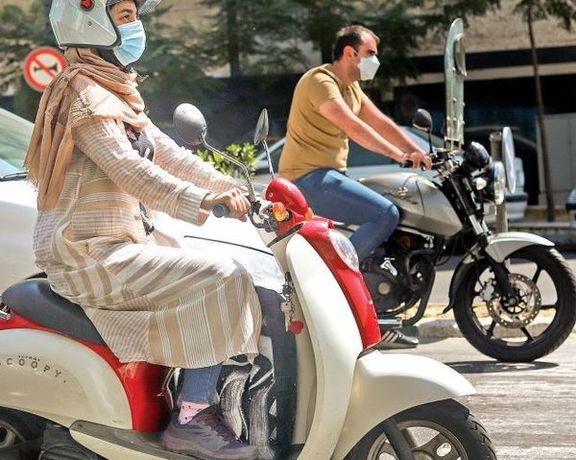
A video on social media shows government security forces in Iran clashing with and detaining a male motorcyclist who was giving a ride to a woman without hijab.
The video shows how law enforcement personnel confiscate a motorcycle from the man, while citizens attempt to thwart their efforts.
In response to the video, a social media user remarked, "It seems like you radical extremists have decided to engage in a full-scale civil war with the great Iranian nation. Be aware that you will face heavy consequences for this, so brace yourselves for the steep toll you will pay."
These events unfold less than a month prior to the anniversary of the tragic killing of Mahsa Amini by hijab police last September, as the regime takes up measures to forestall nationwide anti-regime protests.
In recent months, an increasing number of Iranian women have taken to riding motorbikes on the streets and highways, following the Woman, Life, Freedom protest movement that erupted in September 2022. Riding motorcycles, along with ditching the hijab, has become a courageous act emblematic of the civil rights struggle by women.
Prior to the 1979 revolution that ushered in the Islamic regime in Iran, women were permitted to ride motorcycles. However, in the subsequent years, along with forced hijab, riding motorcycles and even bicycles became restricted.
Nonetheless, numerous Iranian lawyers and activists contend that since Iranian women are permitted to ride motorcycles as passengers, there is no rationale for barring them from being drivers.






